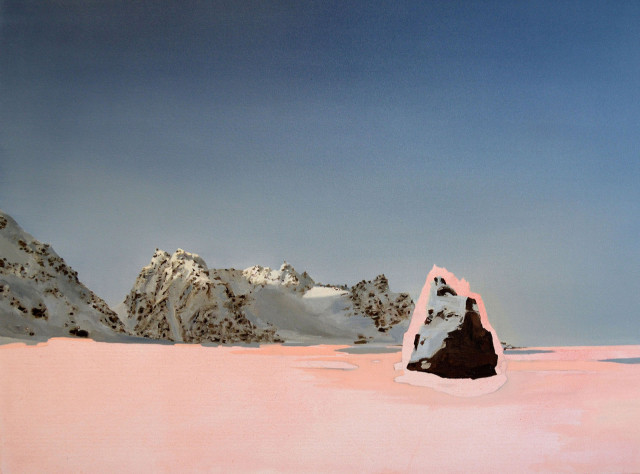
Beau Carey, Fata Morgana, 2013, oil on canvas, 36 x 48 inches
Beau Carey: Rise
November 21, 2015 – January 9, 2016
November 21, 2015 – January 9, 2016
516 ARTS spotlights two of Albuquerque’s most prolific painters with concurrent solo exhibitions exploring contemporary changes in the landscape while referencing the rich history of classical and 19th century American Landscape painting. Beau Carey: Rise will be featured upstairs and Scott Greene: Bewilderness will be downstairs.
“By using references to navigational coastal profiling and by borrowing and subverting compositional structures of the 19th century American landscape painters I examine how modern landscapes came to be spatially constructed. Through a combination of on-site field studies and larger studio pieces I make bodies of work that reflect the individual characteristics of a specific place while retaining a critical awareness of the landscape genre. This practice, while fully absorbed into the cliché of modern landscape painting, is not innocuous. It is rooted in a history of globalism and environmental dominance. Through my work I explore this spatial language at times allowing individual works to teeter into abstraction. The works in Rise look specifically at how we will navigate and view a rapidly changing physical world.” This exhibition was curated by Claude Smith.
ABOUT THE ARTIST
Albuquerque artist Beau Carey has been an artist in residence at Redline Denver, the Arctic Circle in Norway, and Denali National Park in Alaska where he was the park’s first wintertime resident. In the summer of 2015 Beau was one of five artists to be in residence on Rabbit Island in Lake Superior. Working both at remote locations in the field and at home in the studio, his work explores historical and contemporary issues surrounding landscape painting and land use. He is a founding member of Denver’s Tank Studios and has exhibited throughout the country.
Press
Kathaleen Roberts, “Stark Beauty,” Albuquerque Journal
Maggie Grimason, “Presence and Absence in the Landscape,” Alibi
Wesley Pulkka, “Modern Perspectives,” Albuquerque Journal